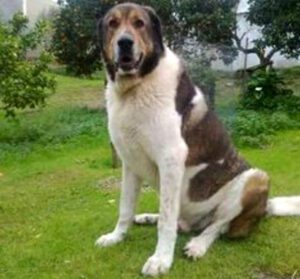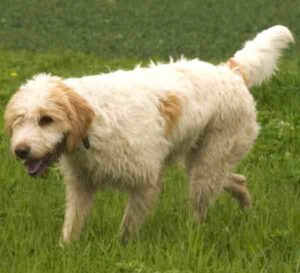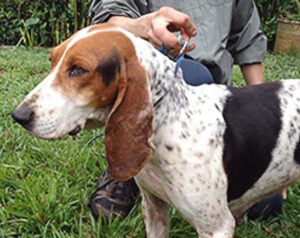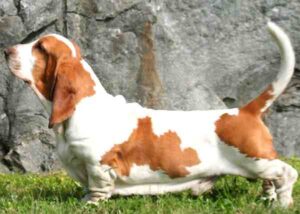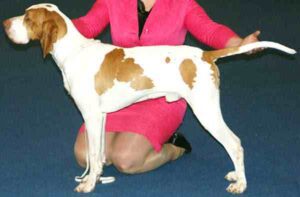The Catahoula Leopard dog is a breed of dog in the herding group. It has traditionally been used in hunting feral boars. It is also known by some other names such as Louisiana Catahoula Leopard Dog, Catahoula Cur and Catahoula Hog Dog.
It is actually an American breed named after Catahoula Parish, Louisiana. It became the state dog od Louisiana in 1979.
The breed is recognized by the United Kennel Club (UKC) under the name Louisiana Catahoula Leopard Dog, and Catahoula Leopard Dog in the American Kennel Club (AKC) Foundation Stock Service. Both registries have assigned the breed a herding group designation.
The breed is probably the result of breedings between local dogs and the Bloodhounds, Mastiffs, and Greyhounds brought to the area by Spanish explorers.
The Catahoula lineage is unknown. One theory suggests the breed originated in the mid-1700s when French settlers emigrated to what became Louisiana with Beauceron dogs. The settlers crossbreed their dogs with well-adapted swamp hunting wolf dogs owned by Native Americans in an effort to develop a better working dog. In the 1800s, breeding intensified in an effort to develop a family dog that was well-suited to work, hunt, and guard yet good with children.[1]
The Louisiana Catahoula Cur Association was formed in 1976, followed by the National Association of Louisiana Catahoulas in 1977. Other organizations are the Catahoula Cur Breeders Association, which registers Catahoulas, and the American Catahoula Association, which works to promote and maintain the breed’s conformation and working ability through shows, clinics, trials and certified testing.
Catahoula Leopard Dog Characteristics
The Catahoula Leopard dog is a medium sized breed with beautiful appearance. As a working dog, it has been breed primarily for temperament and ability rather than for appearance. As a result, the physical appearance or characteristics of these dogs are somewhat varied.
These dogs are generally muscular with rectangular shaped body. They tend to have a large head with drop ears and strong, slightly tapered muzzle.
They have a single smooth short or coarse medium coat. The short looks almost painted. The medium can have extended ‘feathering’ on the hind lengs, tail and chest.
They tend to have a thick muscular neck and a long curved tail. And they come in many colors and have medium/short hair. Their common colors include blue merle, red merle, brindle, and solid colors. They may have any eye color or combination of colors including blue, brown, green, or amber.
Average body height of the Catahoula Leopard dog is between 22 and 26 inches at the withers for males, and between 20 and 24 inches for the females. Average live body weight of the mature dog is between 20 and 50 kg for males, and between 18 and 41 kg for the females.
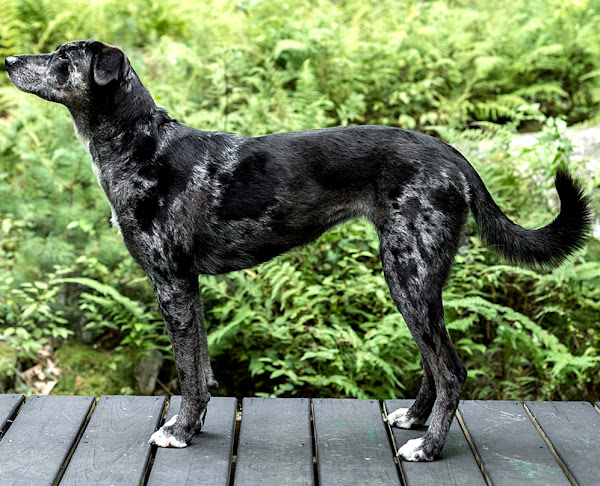
Temperament
The Catahoula Leopard dogs are highly intelligent and energetic. They are assertive dogs, but can also have issues with interdog aggression and intolerance to strangers.
Their original purpose of hunting hogs, controlling cattle etc. has bred in high prey drive. Small animals including cats and chickens may be injured by them (even when raised with them).
Some dogs do not always make a good family dog, and are better suited to a working or active performance home.
Aggression, destructive behavior, and undesirable behaviors all begin when inadequate mental and physical exercise is provided.
Most of the Catahoula Leopard dogs are good with children, and will protect them against aggressors. Most are also good with unknown children and their contact with the dog’s ‘pack/family’, but they are wary of unknown adults.
Socialization and training from a young age may help lessen some undesirable behaviors, but may not completely eliminate them.
Lifespan
Average lifespan of the Catahoula Leopard dog is between 10 and 14 years.
Feeding
How much a mature dog eats depends on it’s size, age, build, metabolism and activity level. Dogs are individuals, just like people, and they don’t all need the same amount of food.
The Catahoula Leopard dogs are medium in size and are very active. So, their diet should be formulated for a medium sized breed with high exercise needs. You can consult with a vet in your area for better feeding recommendations.
Caring
Taking good care of the animals is very important for raising Catahoula Leopard dogs. It is not a dog that can be tied out in the yard and left on it’s own. It needs companionship and exercise to stay healthy and happly.
Try to give these dogs at least an hour of exercise daily. Engage it’s mind with training sessions or fun activites.
Early and frequent socialization is a must for this dog, especially if you want your dog to be friendly toward or at least tolerate other animals.
With proper training, consistency and socialization, your dog will be a wonderful family member who will protect and love you unconditionally.
Health
The Catahoula Leopard dogs are generally healthy. But like all other dog breeds, they are also prone to certain health conditions.
Their common health problems include deafness and hip dysplasia. Always try to keep good contact with a vet in your area.
| Breed Name | Catahoula Leopard |
| Other Names | Also known as Louisiana Catahoula Leopard Dog, Catahoula Cur and Catahoula Hog Dog |
| Breed Size | Medium |
| Height | Between 22 and 26 inches at the withers for males, and between 20 and 24 inches for the females |
| Weight | Between 20 and 50 kg for males, and between 18 and 41 kg for the females |
| Good as pets | Yes |
| Climate Tolerance | All climates |
| Color | Varied |
| Lifespan | Between 10 and 14 years |
| Good for children | Yes |
| Rarity | Common |
| Country of Origin | United States |
